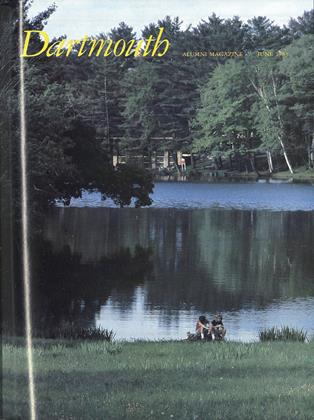Novelist Kurt Vonnegut delivered the closing address of the Ivy League conference "Issues of Nuclear Arms" held last month at Dartmouth. Vonnegut, whose works include Slaughterhouse Five,Mother Night, Cat's Cradle, and Breakfast of Champions, was at the College for six days under the auspices of the fellowship program established in 1978 by Harle and Kenneth Montgomery '25. A charmingly unpolished speaker, the novelist delighted large audiences with his penetrating wit and perfect timing. The point of his nuclear arms address, entitled "A Fate Worse Than Death," was that most people, when you get right down to it, prefer slavery to death. The pithy power of just such homely truths informed most of Vonnegut's commentary. S.G.
In Eastern meditation, nothing happens. But in the West, we meditatebooks. We have found a way of meditating that is far superior. A person wit anordinary mind can meditate with a much-better mind. That's what's so greatabout our civilization. And that's what's so great about reading.
I broke the secret of the Dresden fire-bombing. People wouldn't haveknown about it if it wasn't for Slaughterhouse Five. The bombing ofDresden did not free anyone from a concentration camp one secondsooner. 135,000 people were massacred in the course of a few hours. Itdid nothing but destroy a world-class city, I maintain that I am theonly person in the world who benefitted from the bombing of Dresden. Igot three dollars for every person killed.
What do I want my books to accomplish? Well, I hope eventually todestroy the American army as an effective fighting force. It's okay ifthey march up and down, but I don't want them to be an effectivefighting force.
We haven't avoided a global war for 38 yearsbecause of nuclear arms. We would have hadpeace for a third of a century even if our warheads had been filled with Hostess Twinkiesandjelly beans. Europe has been at peace becauseof the memory of two world wars. People nowunderstand that wars are not jolly adventures.They are the most repulsive of all diseases.
People are changing. They aren't so ignorantand bloodthirsty any more.
The Cinderella story is a basic story shape in our society. One by one, thefairy godmother gives Cinderella all the things she needs to get to theparty the dress and the pantyhose and the shoes and the transportationand then Bong! Bong! Bong! Bong! she loses it all. She goesalong almost as low as before (she has the memory to keep her up a little)until the shoe fits, and then her fortunes go out of sight. Creation mythsall start like that God gives you the sun and the moon and the salmonand the corn but only our society has a creation myth that's as bizarreas the Cinderella story, where everything gets taken away from youagain. I see the part until the shoe fits as the Old Testament, and thencomes the New Testament. It's a crazy shape for a myth.
Books don't damage society till 20 years after they're published. See, it'smostly young people who are influenced by books, who are liable to betotally wowed. I can't be wowed by a book now. Between the ages of 14and 25, though, I was terribly vulnerable. I was wowed by Dos Passos,Steinbeck, Hemingway. They had a lot to do with the formation of mycharacter, my politics. And it took 20 years for me to get old enough tohave any power and influence in my society. And so, people who have readme when they're young it'll take 20 years before anyone'll listen tothem. And I think they'll have my crackpot ideas, a lot of them.
 View Full Issue
View Full Issue
More From This Issue
-
 Feature
FeatureThe View from the Women's Locker Room
June 1983 By Agnes Kurtz -
 Feature
FeatureHigh Tech Crisis
June 1983 By Shelby Grantham -
 Feature
FeatureKeeping Dartmouth Diverse
June 1983 By Steve Farnsworth '83 -
 Feature
FeatureJustifiable Pesticide
June 1983 By Robert Bell '67 -
 Cover Story
Cover StoryIn Ledyard's Wake
June 1983 By Jean Hanff Korelitz '83 -
 Feature
FeatureThe Way it Was
June 1983 By COMMENCEMENT '83
S.G.
-
 Article
ArticleA Versatile, Admirable Teacher With "Every Feature of a Drill Sergeant'(sic)
March 1977 By S.G. -
 Article
ArticleA Red Letter Day
April 1977 By S.G. -
 Article
ArticleThe Call Heard Round the World
OCT. 1977 By S.G. -
 Article
ArticleResident Rotiferologist
DEC. 1977 By S.G. -
 Article
ArticleOf God, Man, and Mountains
JAN./FEB. 1978 By S.G. -
 Article
ArticleAlchemist to the College
APRIL 1978 By S.G.
Features
-
 Feature
FeatureToro's President
DECEMBER 1966 -
 Feature
FeatureReport of the Office of Development
September 1975 -
 Feature
FeatureHow the Right Went Wrong
Jan/Feb 2007 By JAMES PANERO ’98 -
 Feature
FeatureWhat It Was Was Grid-Graph
October 1980 By John R. Scotford Jr. -
 Feature
FeatureScotching the Myth About Alumni Sons
MAY 1967 By RAYMOND SOBEL, M.D. -
 Feature
FeatureHYBRIS AND SOPHROSYNE
JULY 1970 By WILLIAM AYRES ARROW SMITH, LITT.D. '70


